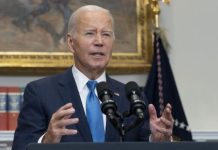
Oct. 26 (UPI) — The Biden administration will lift a nearly two-year travel suspension early next month, allowing fully vaccinated travelers from 33 countries to fly into the United States, the Centers for Disease Control and Prevention announced Monday.
Beginning Nov. 8 non-immigrant travelers will be permitted to travel to the United States if they are able to provide proof that they are fully vaccinated along with a negative COVID-19 test taken no more than three days before boarding their flight, the CDC said in a news release Monday.
“I have determined that it is in the interests of the United States to move away from the country-by-country restrictions previously applied during the COVID-19 pandemic and to adopt an air travel policy that relies primarily on vaccination to advance the safe resumption of international air travel to the United States,” Biden said in a proclamation announcing the order.
The CDC added there would be “very limited” exceptions to the vaccination requirement for certain non-U.S. citizens who are not immigrants, including children younger than 18.
For travelers who are not fully vaccinated, regulations will tighten to require that they provide a negative COVID-19 test taken no more than one day before traveling to the United States.
Air passengers will also be required to provide basic contact information to airlines before boarding flights to the United States to allow airlines to more easily conduct contact tracing.
In the past two years, people who weren’t U.S. citizens could not enter America if they had been to one of the 33 countries including China, Iran and most nations in Europe in the 14 days prior to their proposed arrival in the United States.
Passengers must also have received a vaccine approved by the Food and Drug Administration and the World Health Organization, including vaccines developed by Pfizer-BioNTech, Moderna, Johnson & Johnson, Oxford-AstraZeneca (and Covishield), and China’s Sinopharm and Sinovac vaccines.
The move comes two weeks after the United States fully opened its land borders to fully vaccinated travelers from Mexico and Canada.
On Monday, the CDC also announced it would extend its Framework for Conditional Sailing Order through Jan. 15.
“The pandemic isn’t over. We’ve seen what the Delta variant can do,” Capt. Aimee Treffiletti, who leads the CDC’s maritime unit told USA Today. “Despite, you know, really what have been the best efforts of the cruise industry to provide a safer and healthier environment for crew, passengers and communities, COVID-19 has still been a challenge, particularly with the Delta variant.”
The order, which was originally issued on Oct. 30, required cruise ship operators to build and staff laboratories on board their vessels to test crew and passengers, while also updating a color-coded system to indicate the ship’s status along with procedures for surveillance of COVID-19 on board.
Along with Monday’s extension, the CDC also altered the order to apply to foreign-flagged commercial passenger vessels with the capacity to carry 250 people operating or planning to operate for overnight stays for passengers or crew in U.S. waters.
Following the extension, the CDC said it will transition to a “voluntary program” to continue efforts to detect, mitigate and control the spread of COVID-19 on cruise ships.





